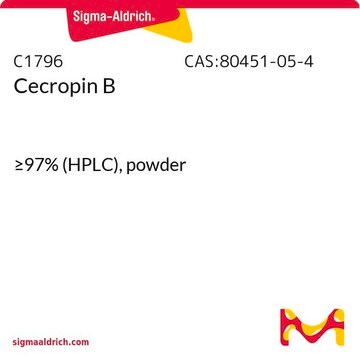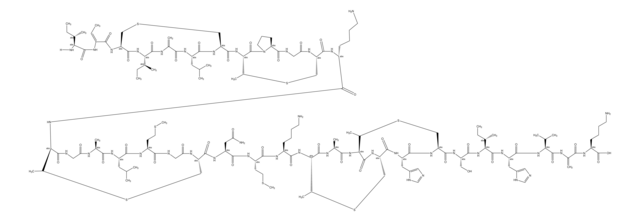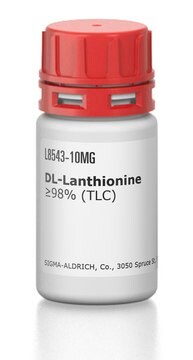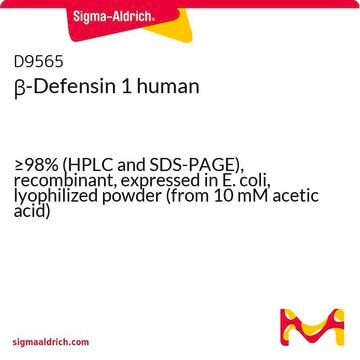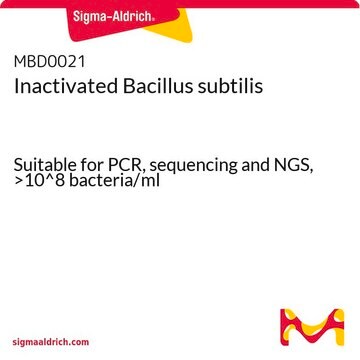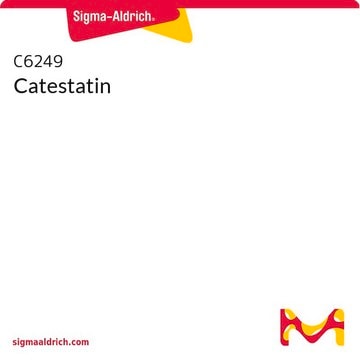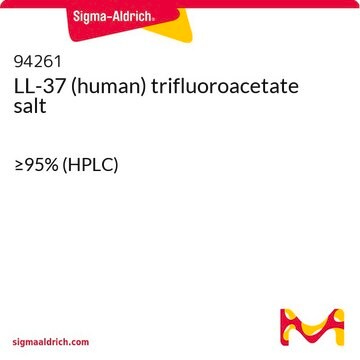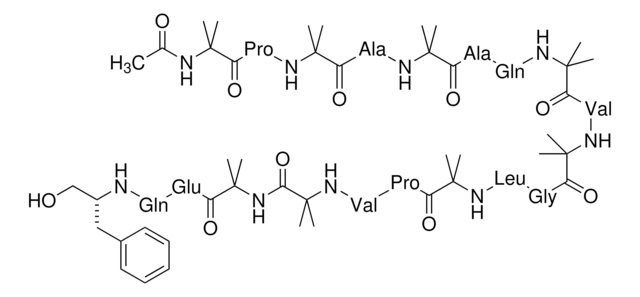About This Item
Recommended Products
Quality Level
Assay
≥97% (HPLC)
form
powder
antibiotic activity spectrum
fungi
viruses
Mode of action
cell membrane | interferes
storage temp.
−20°C
InChI
1S/C184H313N53O46/c1-27-98(16)145(182(282)235-149(102(20)31-5)181(281)218-115(59-39-46-76-187)159(259)206-103(21)152(252)205-92-138(246)237-82-52-65-130(237)173(273)208-106(24)154(254)228-143(96(12)13)176(276)209-107(25)155(255)229-144(97(14)15)177(277)231-142(95(10)11)175(275)204-89-135(243)211-121(66-70-131(193)239)160(260)207-105(23)156(256)236-150(108(26)238)183(283)221-123(68-72-133(195)241)168(268)232-146(99(17)28-2)178(278)210-104(22)153(253)213-114(151(197)251)58-38-45-75-186)227-137(245)91-202-158(258)129(87-140(249)250)226-163(263)120(64-51-81-200-184(198)199)219-179(279)148(101(19)30-4)234-172(272)128(86-134(196)242)225-164(264)122(67-71-132(194)240)212-136(244)90-203-174(274)141(94(8)9)230-166(266)118(62-42-49-79-190)215-165(265)124(69-73-139(247)248)220-180(280)147(100(18)29-3)233-167(267)119(63-43-50-80-191)214-161(261)116(60-40-47-77-188)216-170(270)126(84-109-53-33-32-34-54-109)224-169(269)125(83-93(6)7)223-162(262)117(61-41-48-78-189)217-171(271)127(222-157(257)112(192)56-37-44-74-185)85-110-88-201-113-57-36-35-55-111(110)113/h32-36,53-55,57,88,93-108,112,114-130,141-150,201,238H,27-31,37-52,56,58-87,89-92,185-192H2,1-26H3,(H2,193,239)(H2,194,240)(H2,195,241)(H2,196,242)(H2,197,251)(H,202,258)(H,203,274)(H,204,275)(H,205,252)(H,206,259)(H,207,260)(H,208,273)(H,209,276)(H,210,278)(H,211,243)(H,212,244)(H,213,253)(H,214,261)(H,215,265)(H,216,270)(H,217,271)(H,218,281)(H,219,279)(H,220,280)(H,221,283)(H,222,257)(H,223,262)(H,224,269)(H,225,264)(H,226,263)(H,227,245)(H,228,254)(H,229,255)(H,230,266)(H,231,277)(H,232,268)(H,233,267)(H,234,272)(H,235,282)(H,236,256)(H,247,248)(H,249,250)(H4,198,199,200)/t98-,99-,100-,101-,102-,103-,104-,105-,106-,107-,108+,112-,114-,115-,116-,117-,118-,119-,120-,121-,122-,123-,124-,125-,126-,127-,128-,129-,130-,141-,142-,143-,144-,145-,146-,147-,148-,149-,150-/m0/s1
InChI key
HCQPHKMLKXOJSR-IRCPFGJUSA-N
Looking for similar products? Visit Product Comparison Guide
Amino Acid Sequence
General description
Application
- to test its cytotoxic effect on breast adenocarcinoma (MDA-MB-231) and human mesothelioma (M14K) cell lines
- in ultrasensitive radial diffusion assay against E coli to test Galleria mellonella protein 24 and apolipophorin III effects
- to test its minimal inhibitory concentrations (MICs) in sensitivity assay for Photorhabdus variants
Biochem/physiol Actions
Other Notes
Storage Class Code
11 - Combustible Solids
WGK
WGK 3
Flash Point(F)
Not applicable
Flash Point(C)
Not applicable
Personal Protective Equipment
Regulatory Listings
Regulatory Listings are mainly provided for chemical products. Only limited information can be provided here for non-chemical products. No entry means none of the components are listed. It is the user’s obligation to ensure the safe and legal use of the product.
JAN Code
C6830-.5MG-PW:
C6830-.1MG-PW:
C6830-.1MG:
C6830-.5MG:
C6830-BULK:
C6830-VAR:
Certificates of Analysis (COA)
Search for Certificates of Analysis (COA) by entering the products Lot/Batch Number. Lot and Batch Numbers can be found on a product’s label following the words ‘Lot’ or ‘Batch’.
Already Own This Product?
Find documentation for the products that you have recently purchased in the Document Library.
Customers Also Viewed
Articles
Ribosomally synthesized antimicrobial peptides are a promising focus in antibiotic research amidst bacterial resistance and emerging infectious diseases.
Our team of scientists has experience in all areas of research including Life Science, Material Science, Chemical Synthesis, Chromatography, Analytical and many others.
Contact Technical Service
